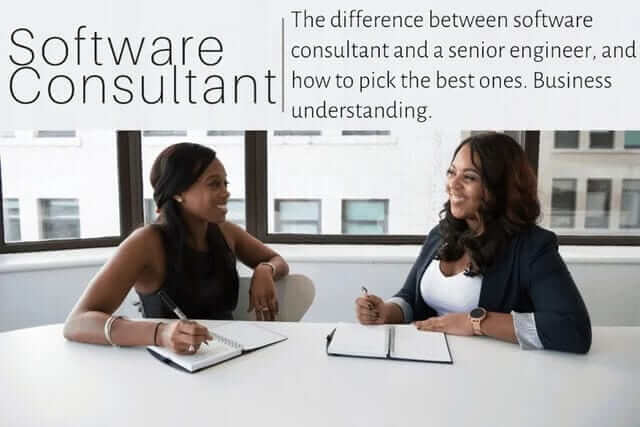

The difference between a software consultant and a senior engineer, and how to pick the best ones.

More and more small businesses are making technology a priority in their day-to-day operations. Customer relationship management (CRM) systems, financial software, and hardware are gaining traction in small businesses for their abilities to streamline a company’s workflow and improve efficiency, among other things.
As such, the need for software providers, consultants, developers, and other professionals has also grown. However, to the untrained eye or for non-technical founders, CEOs, and executives, it’s often difficult to figure out which IT professional they need to work with. After all, with all the different job titles, the search for a company’s next IT professional can be confusing.
Here, we’ll explore the roles and responsibilities of software consultants and what they bring to the table. Software development services provider DevsData explains that whether you are starting a product from scratch or you already have a software team and are looking to grow it, you need the right professionals for specific types of development projects. They are critical to the success of any project.
A software consultant is an IT professional hired to give advice on strategy, design, building, and sometimes implementation of software that solves business problems. They carry out these tasks often with the collaboration of software developers. These professionals are usually senior developers with years of experience and know-how in the industry.
As the name implies, the main role of these professionals is a consultancy, i.e. offering their expert advice. They provide an independent and unbiased ‘health check’ of your organization’s current business and tech plans. They zero in on the tech-related weak spots and areas of improvement within the business operations and then propose solutions.
On the other hand, a senior engineer’s job focuses more on the building of software. These professionals design, develop, and install software solutions for a company’s operations. They’re also usually part of a development team, supporting others in the creation and maintenance of IT systems.
Software engineers have numerous years of programming experience, hence their senior status. They usually have advanced knowledge of at least one major programming language, and a strong understanding of other languages as well. They possess project management know-how, and understand coding and frameworks, information analysis, as well as software design, architecture, documentation, testing, and maintenance.
If the software consultants are the ones who make the plan, software engineers make it happen.

Software consultants often work more with various people inside and outside of the organization: executives, stakeholders, and the development team. They spend a lot of time coordinating with and communicating to different teams to ensure alignment. This includes giving updates and sharing concerns about the project timeline, progress, deadlines, overall costs, milestones, and other related matters.
Senior engineers, meanwhile, spend most of their time with the development team, doing coordination and problem-solving tasks. This can be anything from debugging codes and technical discussions with their team members to improving workflow processes.
A dependable software consultant looks at the technology from a business perspective. They offer advice on the latest tech trends and best practices, set ambitious-but-achievable project goals and KPIs, and understand the marketing and monetization side of things.
On the other end, engineers take the approved technical specification and implement them. They are rather strict with how they approach their work: they rarely deviate from the tech specs, have a bird’s-eye view of the project, and analyze the pros and cons before giving their opinions to the decision-makers. What is more, they also lay the project groundwork to give the other engineers something to follow.
Regarding software and technology, consultants look at these from the business side. That is, they look at a software’s security, scalability, maintainability, ease of use, and performance. They look at the bigger picture and determine whether the system is ideal not only for the company’s current requirements but also for future needs.
Senior engineers, on the other hand, look at software from the operation side. Their top priority is writing functional code that is easy to maintain. Reliable engineers are very disciplined when it comes to ensuring that anything they develop is functional, easily read and understood, and as bug-free as possible. However, this sometimes means that the security and performance of the software may not get much of a focus.
Consultants usually stay on top of the whole project, keeping tabs on all teams and moving parts. They manage timelines and schedules, resources, and the project scope.
Engineers, meanwhile, focus on managing their workload, team members, and general progress of the entire team. Their role is senior, but not a managerial one, which means they have the tendency to perform better when acting alone as they are able to work with a team but they might have problems communicating with other members.
A great software consultant works on adding or deleting features from the app specification to better suit the target audience, company goals, and market needs to maximize ROI. Again, their focus is on the business side — how the app will help the company.
Engineers, meanwhile, are not that concerned or involved with the market performance reports of their apps. They mostly follow the technical specifications given to them.
Many people get confused by the differences between a software engineer, software consultant and similar position. Listen to the explanation above and your confusion will be a thing of the past.
Do not settle for someone who raises red flags. Talk to candidates about specifics, probe their understanding of software and technology, and scrutinize the projects they have worked on. Go over their track record and previous work. Ask for references. When you have all the information, it will be easier to choose a consultant who shares your company’s vision for the project. Oftentimes, these are the ones who make you feel excited about kicking off the project.
Ask candidates questions or give them situations that are as close as possible to the real work you will be hiring them to do. Their specialty should fit your needs. Moreover, they should be familiar with your industry, its key trends, as well as the specific project skills you need.
Keep engaging with world-class candidates. Remember that it may take some time to find the right ones. Do not settle for someone just because you are pressed for time or budget. Keep checking hiring platforms, referrals, prospecting, inbound marketing, and other recruitment channels.
Most companies will have several competing interests that will influence the direction of a project. A top-notch consultant will show their motivation by pinpointing the most crucial and practical needs and requirements, while keeping the timeline and budget within range.
Even with the most rigorous recruitment process, it is often impossible to check everything. Usually, it might be a good idea to give the candidate a set of paid trial tasks that they perform within an agreed time period. This will test how quickly they understand the codebase and project in general, and whether they can get along with other team members.
If the candidate is on the market right now, it might even be a good idea to give them a week-long ‘test run’ of working for your company before signing the agreement. Next, after signing the contract, it is advisable to agree on a probation period of about three months.

A software consultant always looks at technology from the business perspective. They offer advice on latest technology trends and best practices. Their main goal is to help clients make better business decisions.
Additionally, consultants tend to look at the bigger picture and think outside the box. They keep your marketing goals and business objectives in mind, while ensuring that engineering adjustments and decisions are still within the allocated budget, timeline, and client requirements.
Engineers, meanwhile, focus on managing their workload, team members, and general progress of the entire team. Their role is senior, but not a managerial one, which means they have the tendency to perform better when acting alone.
Frequently asked questions (FAQ)
DevsData – your premium technology partner
DevsData is a boutique tech recruitment and software agency. Develop your software project with veteran engineers or scale up an in-house tech team of developers with relevant industry experience.
Free consultation with a software expert
🎧 Schedule a meeting
FEATURED IN


DevsData LLC is truly exceptional – their backend developers are some of the best I’ve ever worked with.”
Nicholas Johnson
Mentor at YC, serial entrepreneur


 Build your project with our veteran developers
Build your project with our veteran developers
 Explore the benefits of technology recruitment and tailor-made software
Explore the benefits of technology recruitment and tailor-made software
 Learn how to source skilled and experienced software developers
Learn how to source skilled and experienced software developers




Categories: Big data, data analytics | Software and technology | IT recruitment blog | IT in Poland | Content hub (blog)
